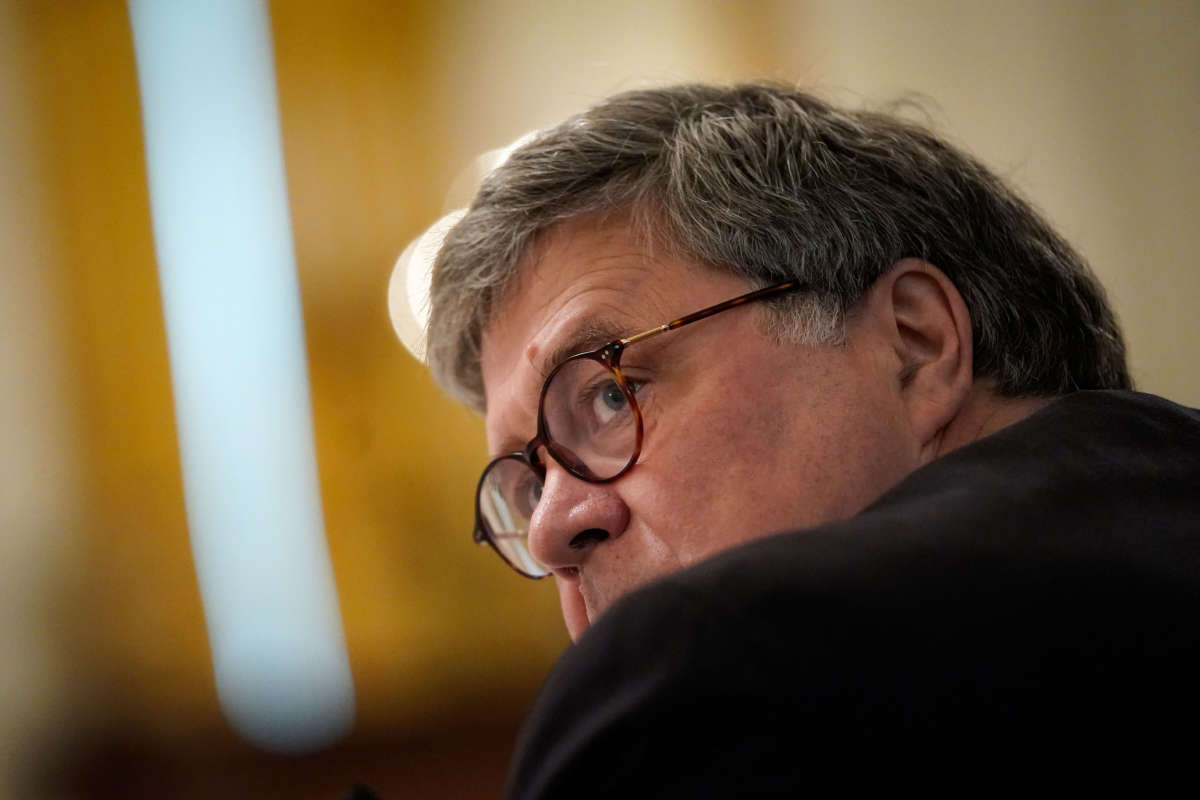A letter to the District of Columbia Bar Association is asking the organization to take the serious step of investigating Attorney General William Barr’s conduct on at least four important matters, a move that could lead to the group taking disciplinary steps against him in the future.
The letter contains nearly 30 signatures from members of the bar, including four former presidents. Andrea Ferster, Philip Allen Lacovara, Marna S. Tucker and Melvin White, all former presidents of the D.C. Bar Association, also added their names to the complaint.
The actions taken by Barr that have raised the strong misgivings among the signers of the note are those of a political nature and involve Barr’s dealing with matters related to President Donald Trump.
“Mr. Barr’s client is the United States, and not the president,” the letter stated. “Yet, Mr. Barr has consistently made decisions and taken action to serve the personal and political self-interests of President Donald Trump, rather than the interest of the United States.”
The letter lists four reasons why a probe into Barr’s actions is necessary. First, upon receiving the Mueller report in 2019, which investigated whether Trump’s 2016 presidential campaign had coordinated with Russia or engaged in acts of obstruction of justice during the investigation, Barr “engaged in dishonest and deceitful conduct” in announcing his opinion on the matter.
At the time, Barr had publicly announced, without allowing public inspection of Robert Mueller’s investigation, that “the evidence developed during the Special Counsel’s investigation is not sufficient to establish that the President committed an obstruction-of-justice offense.” Yet days later, Mueller wrote a letter to Barr, stating that the attorney general’s statement “did not fully capture the context, nature, and substance of this Office’s work and conclusions.”
Indeed, later on that spring, Mueller made public comments about the possible criminal behavior that the president himself may have engaged in. “If we had had confidence that the president clearly did not commit a crime, we would have said so,” Mueller said in late May.
The letter to the D.C. Bar Association next suggested that Barr abandoned “all precedent by attacking an inspector general’s report” that later came out, looking into allegations from Trump that the initial investigations into his campaign were biased. Barr “acted in alignment with the president’s narrative that the FBI’s investigation into his campaign was illegitimate,” the letter-writers stated, in spite of the fact that the actual report, though finding some things problematic with the investigation, found no biases against Trump in how the investigation was conducted.
Third, the complaint to the bar association took issue with how Barr conducted himself in television interviews related to that probe. Barr “publicly malign[ed] the conduct of FBI personnel who [were] the subject of a criminal investigation,” the letter stated. In doing so, he also “undermined the fairness of future criminal proceedings involving those individuals … using language that no ethical prosecutor would use” when discussing such matters.”
Finally, the complaint against Barr noted his role in the tear gassing of peaceful protesters outside the White House in Lafayette Square, which was done in order to allow Trump to have an unimpeded walkway to a nearby church for a photo-op.
“In overseeing and ordering the unconstitutional attack on citizens peacefully protesting in Lafayette Square, the attorney general violated his lawyer’s oath,” the letter stated. “With the whole world watching, he demonstrated the starkest, anti-constitutional harm that a conflict of interest can cause.”
Investigating how Barr has conducted himself as attorney general, and looking into how the D.C. Bar Association can discipline him, is an important matter, the letter goes on to say, because Barr is “no ordinary lawyer.” He “is the highest law enforcement officer in the nation,” and his “violations of professional responsibility bring more damage to the reputation of our profession and its integrity than violations by any other attorney in the country.”
“The grounds described above call out for a disciplinary proceeding to be initiated,” the letter added.
Whether the bar association determines action is warranted or not, any action taken on its behalf against Barr won’t likely come about for some time, as such procedures tend to take years to complete. The bar association’s actions won’t be transparent, either, as its investigations are done in a private way.
Join us in defending the truth before it’s too late
The future of independent journalism is uncertain, and the consequences of losing it are too grave to ignore. To ensure Truthout remains safe, strong, and free, we need to raise $43,000 in the next 6 days. Every dollar raised goes directly toward the costs of producing news you can trust.
Please give what you can — because by supporting us with a tax-deductible donation, you’re not just preserving a source of news, you’re helping to safeguard what’s left of our democracy.
